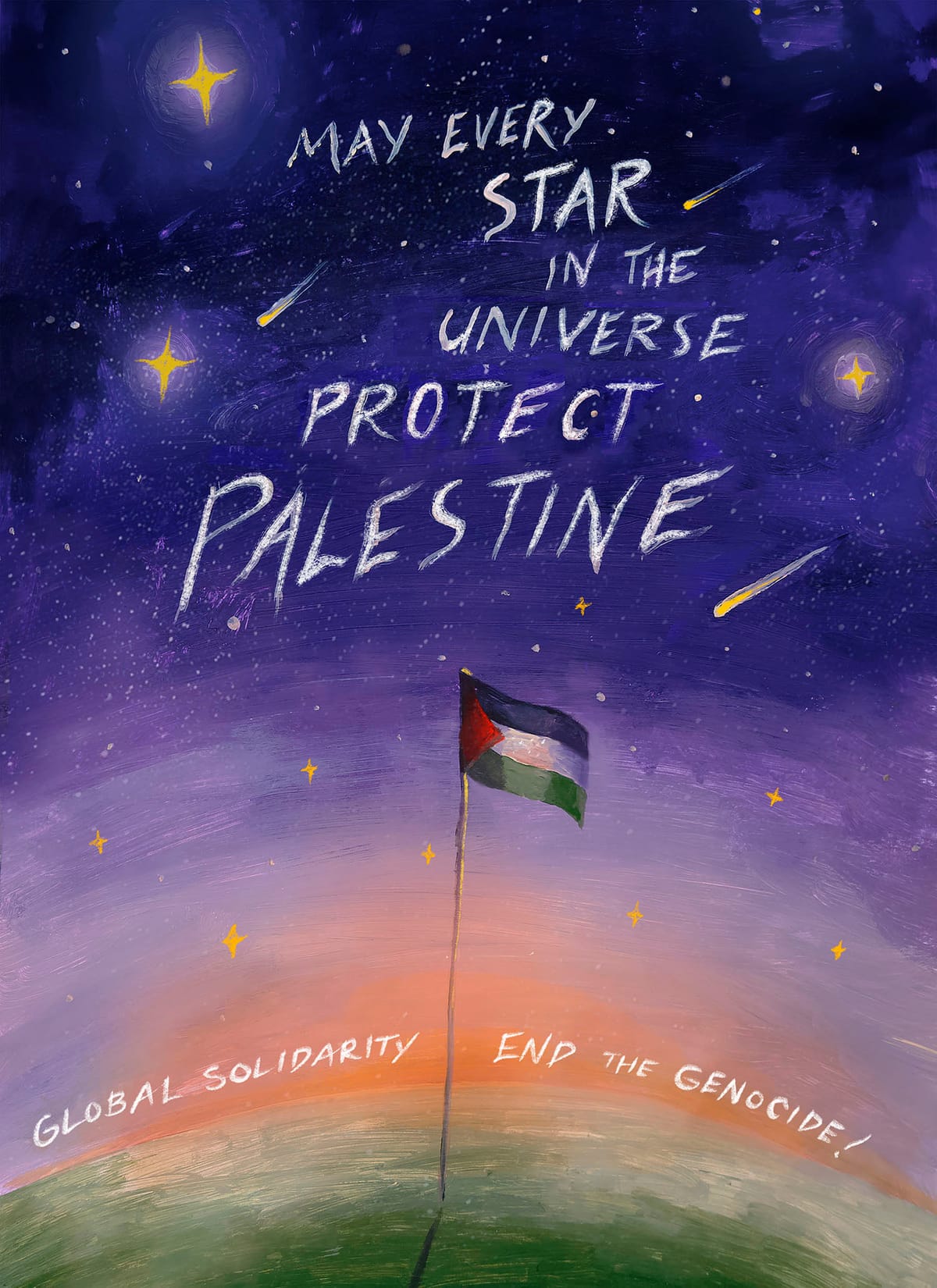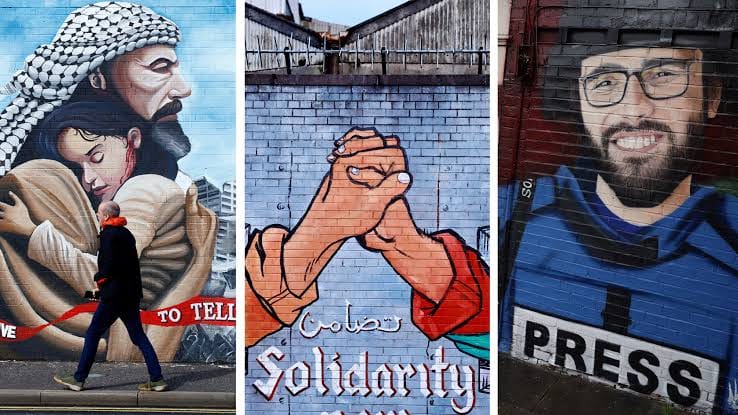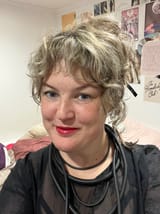How to react to a harrowing nightmare
“When you fight for someone you love, it feels so much more powerful than fighting against someone you hate.”

“I cry every night after I put my children to bed. Every time I open my phone I see dead children. How are we meant to live as normal and shouldn’t we stop living normally?”
“Every time I wrap my baby in a swaddle I see the babies in Palestine in their shrouds after being killed. I can’t get it out of my head. I feel so guilty that my babies are safe and their babies are not.”
“Seeing Gaza, what they’ve done to Palestinians, it makes me think maybe we should all die. Sometimes I see the videos from Gaza and I think we don’t deserve this planet.”
“I can’t cope with my family in the church not speaking out against the genocide. It’s making me lose my faith. It is like all of the things we were taught, what the bible says, doesn’t matter anymore and I don’t understand. How can there be a God when thousands of babies are murdered and people celebrate?”
“I keep having nightmares where I see the beheaded children and body parts I’ve seen on Instagram.”
In less than an hour I had more than 80 messages begging for help. I’d put out a call to readers on Instagram asking if they had questions for counsellors about surviving in these terrifying times.
Survival feels like the wrong word, because we are watching - live - Palestinians trying to survive. Really survive. They’re hiding from missile strikes, from occupation soldiers shooting anyone who moves, from starvation, from disease.
But, I don’t know what the word is, for this thing - trying not to lose hope in humanity when we have humans being so inhumane.
So, I contacted many therapists, counsellors and the groups that represent them, to try to get answers to the questions sent to me. Only three responded. Two were too busy and sent apologies. I remain hopeful others will get in touch or maybe someone is reading this who might want to help.
Danni is a mum and counsellor. She asked for us not to use her last name to protect the charitable organisation she works for.
When we talked about the questions that came through, Danni related deeply to them herself. She talked about her hope for liberation in Palestine and wanted to caveat her advice before we began.
“I am working with the same scary landscape with no road map,” she said on a gloomy Wellington day.
“So, bearing that in mind, I don’t think my answers will be conclusive, or all encompassing. They may be flawed and like with therapy - results are not guaranteed. But it’s worth a try eh?”

So where to start? I guess with what I saw again and again in my DMs: “I feel like I am losing my mind - what do I do?”.
“First and foremost I feel it is imperative to acknowledge how unnatural and unprecedented the current situation is. Never before has a genocide been live streamed. Technology has allowed people enduring the worst possible experiences of humanity to have the ability to reach out to the world and be heard - this is not a bad thing.”
“The flip side is we are, well depending on our algorithm, seeing horrific acts of violence interspersed between adverts, friends partying and reels for recipes. None of this is normal, there is no rule book on how to react to this dystopian nightmare and I want to acknowledge the humanness in the questions your followers have asked.”
Danni is hopeful as well as devastated. It’s hard not to feel hopeful too when she explains that meeting this awful moment in time with our humanity intact will help us in the long-term to create the change we so desperately need.
“My clinical and personal belief is that learning ways to navigate the experiences we are having as a result of the vicarious trauma will be skills that will serve you in your own lives. And it will change the way we view humanity.”
I am finding it hard to think about anything else but the genocide. Even more so, I am finding that I feel real hatred. It’s a feeling I haven’t felt before. The genocide is so awful that it’s making me hate. What can I do to stop this feeling of hatred and rage?
What are the best ways to cope while bearing witness without resorting to “looking away”. I don’t want to be told it’s bad for your mental health to pay attention to and speak out against genocide.
I know it is not good for my mental health to see people on fire or all of these dead children but how do you stop looking? I feel like if these people online who support Israel could just see these pictures they would change. Wouldn’t they?
Over and over again, there’s a reeling happening from seeing this horror. I feel like how I view the world has changed - but not for the better. Danni understands and gently suggests feeling your feelings is crucial.
“I again want to acknowledge and validate the humanness of these questions,” she says.
“You are angry? You feel hatred? You’re embarrassed? Amazing. You are experiencing visceral and emotional responses to a traumatic situation.
“However, these feelings are difficult and uncomfortable to feel. Coming from a space of emotional neutrality as in there are no ‘bad’ emotions, just harder emotions to feel - it may be useful to listen to what these emotions are telling you.
“You are angry? Well, this feels like an appropriate response to seeing what you are witnessing and no one is stopping it. Killing children and civilians goes against all narratives of conflicts - this doesn’t sit with our worldview of how things should be.
“It’s challenging and wrong. Your anger may be your sense of injustice screaming out, it may be despair that is too hard to feel. Anger is a trauma and survival response - 'fight, flight, freeze, flop and drop' to name them all.
“You are embarrassed - you are aware of your privilege and the injustice of the birth lottery. All of these emotions are welcome as they are so so much more human than being neutral or unaffected.”
Finding time to acknowledge the emotions may help, Danni says.
“For example, if you feel anger, release it. Anger is a physical emotion so go for a run, yell, scream, angry dance to some aggressive music.”
“Whatever you can do, release that anger, attend to it.
“You might cry afterwards, do that. Our emotions are not bad, what we do with them is what makes the impact. Use the humanness of anger to light a fire for justice. don’t let it burn out.”
Related: A guide to managing difficult feelings around world events | Mental Health Foundation
Specifically when it comes to Palestine, leaning into the humanity of Palestinians when Israel, the United States, world powers and even our own government are trying to dehumanise them is essential. To answer the call to bear witness, we can feel strengthened by the Palestinian people’s courage, resilience and humanity.
“The Palestinian people are incredible. They have endured so much, yet continue," Danni says. "They are strong, loving, funny, generous and incredibly resilient.”
“Read books by Palestinian authors, cook Palestinian dishes, educate yourself on their rich culture”.
Watch shows like Mo on Netflix and watch clips of Palestinian comedians. It’s easy to fall in love with Palestine and her beautiful people. And it helps to stop you from falling into despair.
“Love is the antidote of hate,” Danni says. “When you fight for someone you love, it feels so much more powerful than fighting against someone you hate.”

Then, it’s easier to focus on what can help and will help.
“Let this guide you in your life. Vote with your dollar and support the Boycott Divest and Sanction (BDS) movement. That way you know even in the action of doing your groceries, Palestinian people are front and centre in your decision making and we know that boycotting certain companies is a way to help.”
“Similarly attending rallies, going to vigils, writing your anger to politicians. It may not feel like it is making a difference, and we have not seen many shifts - but the acts themselves are an attempt and also therapeutic because they help you to release anger and be in community with others”.
Related: Climate Mental Health Resources | Tools, Research & Support - Climate Mental Health Aotearoa
Controlling how you engage with distressing content is important. You could try to set aside 15-30 minutes a day to immense yourself in the reality of what’s happening in Gaza.
“Cry, scream, and release. That way you are not seeing images while you’re about to go to a meeting or be with your children.”
Yes, that means no more doom scrolling.
Connecting with Palestinians, finding a GoFundMe campaign and connecting and understanding one family’s story can ground you.
“Fundraise for them, this gives you a project, and connection in your own life which is good for your mental health,” Danni says.
If you can, donate regularly. The mutual aid fund I run is set up so that $2 or $3 from 40-odd people can mean $100+ for a family.
The important thing is to shift from feeling overwhelmed and unable to act to seeing what you can do, even if it feels small.
“We know that doom scrolling is bad for us - even before witnessing genocide,” Danni says. “So finding ways to stay engaged and then act, this will help you shift the emotions that stagnate in your body while we are paralysed witnessing the horrors.”
I’ve been thinking a lot about hopelessness. It was the word used most often in the questions I was sent. It brought to mind something Rebecca Solnit once said:
“Hope just means another world might be possible, not promised, not guaranteed. Hope calls for action; action is impossible without hope.”
I think, in my two and a half decades of activism I’ve learned only one thing - that we must do whatever we can to hold on to hope. Whether that’s seeking out community so we don’t feel alone and isolated or just trying to find light or joy in small things to remind us why we care.
Sometimes I feel guilty when I am joyful - I think ‘what right do I have when mothers have babies dying in their arms’? I turn again to Rebecca Solnit’s wise words.
“Joy doesn't betray but sustains activism. And when you face a politics that aspires to make you fearful, alienated and isolated, joy is a fine act of insurrection.”
I hope this post will be the first in a series on how we can sustain ourselves to nourish our community both at home and in the wide world. I hope we can continue to seek answers on how we can stand against hate at a time when hate has such currency.
Whatever happens, I do have hope. Because I believe in us.
Thank you so much for supporting this mahi by becoming a free or paid subscriber. Any news subscriptions from this post will be donated to the NZ to Gaza mutual aid fund.

